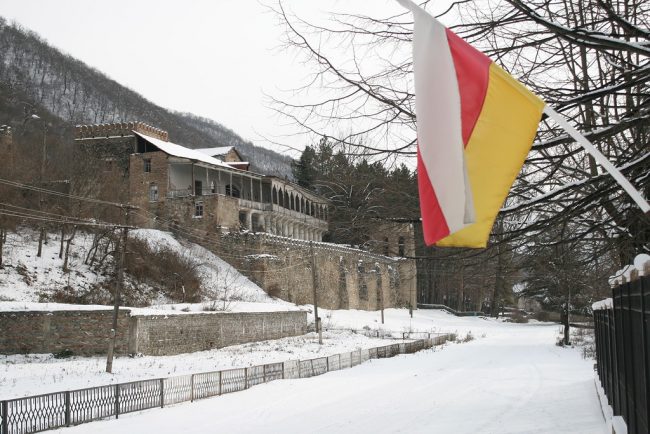

 Authorities in South Ossetia have linked Archil Tatunashvili, a Georgian citizen who died in custody in Tskhinvali (Tskhinval) last week, to a homemade bomb they say they found in Akhalgori (Leningor). A State of emergency has been declared in Akhalgori, and riot police deployed to the district.
Authorities in South Ossetia have linked Archil Tatunashvili, a Georgian citizen who died in custody in Tskhinvali (Tskhinval) last week, to a homemade bomb they say they found in Akhalgori (Leningor). A State of emergency has been declared in Akhalgori, and riot police deployed to the district.
Tatunashvili was arrested on 22 February in Akhalgori, and died in Tskhinvali later that night. According to the South Ossetian security services, he died after falling from the stairs while trying to escape. They also accused him of being a Georgian informant, and ‘participating in Georgian aggression in 2004–2008’.
Mariya Kotayeva, the head of South Ossetia’s Committee on Information and Press, claimed on 1 March that the authorities had found an improvised explosive device at a bridge in Akhalgori. ‘The bomb in Leningor could have been planted by Tatunashvili’, she said at a press conference at the office of Russian state-run media outlet Sputnik Ossetia.
Kotayeva added that at the end of February, police were notified by residents of Akhalgori that they had found the device, which she said consisted of ‘explosives, magnets, wires, and [was] connected to a mobile phone’. She claimed it was as an attempt to ‘destabilise the situation’ during upcoming presidential elections in Russia.
Georgia has called the charges ‘trumped up’.
Tskhinvali refuses to hand over the body
The announcement came soon after Georgian officials walked out of a meeting with South Ossetian officials under the Incident Prevention and Response Mechanism Meeting (IPRM) on 1 March. The IPRM was set up after the 2008 August War.
Despite calls from the EU, NATO, the US, and UK, South Ossetian authorities have repeatedly refused to hand over Tatunashvili’s body until a forensic examination is complete. They say tissue samples have been sent to Moscow for analysis, and that the body remains in Tskhinvali.
‘After 3.5 hour long discussions, we did not get answers to any of our questions’, Kakha Kemoklidze, who represents the Georgian State Security Service (SSG) at the IPRM, told journalists after the meeting.
According to him, Georgia had been asking for the two Georgian citizens who were detained with Tatunashvili to be allowed to leave South Ossetia, and for Tatunashvili’s body to be handed over to his family.
Ioseb Pavliashvili and Levan Kutashvili have been released from custody, but ordered to remain in South Ossetia until the investigation is complete.
State of emergency
RFE/RL’s Georgian service Radio Tavisupleba reported on 2 March that a state of emergency has been introduced in Akhalgori, and a number of riot police units deployed.
According to them, police have been searching everyone entering or leaving Akhalgori — the only crossing point to Tbilisi-controlled territory. South Ossetian authorities say the state of emergency is connected to the upcoming presidential elections in Russia, and that they ‘expect provocations’.
Akhalgori governor Filipp Khachirov, who has been linked to Tatunashvili’s death, has denied that he either knew Tatunashvili, or ordered his death. He told Sputnik Ossetia these reports are aimed at discrediting him.
Georgia’s Minister of Reconciliation Ketevan Tsikhelashvili said on 1 March that ‘every so-called charge against Tatunashvili contradicts the truth’. She added that despite ‘certain powers being interested in thwarting our reconciliation and peace policy, this will not and can not happen’.
For ease of reading, we choose not to use qualifiers such as ‘de facto’, ‘unrecognised’, or ‘partially recognised’ when discussing institutions or political positions within Abkhazia, Nagorno-Karabakh, and South Ossetia. This does not imply a position on their status.







